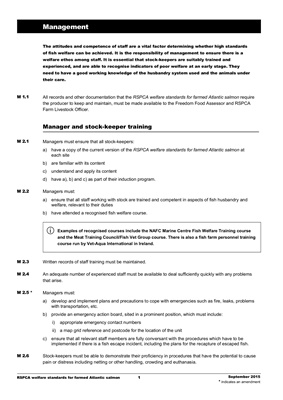
RSPCA welfare standards for farmed Atlantic salmon 1 September 2015
* indicates an amendment
Management
The attitudes and competence of staff are a vital factor determining whether high standards
of fish welfare can be achieved. It is the responsibility of management to ensure there is a
welfare ethos among staff. It is essential that stock-keepers are suitably trained and
experienced, and are able to recognise indicators of poor welfare at an early stage. They
need to have a good working knowledge of the husbandry system used and the animals under
their care.
M 1.1 All records and other documentation that the RSPCA welfare standards for farmed Atlantic salmon require
the producer to keep and maintain, must be made available to the Freedom Food Assessor and RSPCA
Farm Livestock Officer.
Manager and stock-keeper training
M 2.1
Managers must ensure that all stock-keepers:
a) have a copy of the current version of the RSPCA welfare standards for farmed Atlantic salmon at
each site
b) are familiar with its content
c) understand and apply its content
d) have a), b) and c) as part of their induction program.
M 2.2
Managers must:
a) ensure that all staff working with stock are trained and competent in aspects of fish husbandry and
welfare, relevant to their duties
b) have attended a recognised fish welfare course.
Examples of recognised courses include the NAFC Marine Centre Fish Welfare Training course
and the Meat Training Council/Fish Vet Group course. There is also a fish farm personnel training
course run by Vet-Aqua International in Ireland.
M 2.3 Written records of staff training must be maintained.
M 2.4 An adequate number of experienced staff must be available to deal sufficiently quickly with any problems
that arise.
M 2.5 * Managers must:
a) develop and implement plans and precautions to cope with emergencies such as fire, leaks, problems
with transportation, etc.
b) provide an emergency action board, sited in a prominent position, which must include:
i) appropriate emergency contact numbers
ii) a map grid reference and postcode for the location of the unit
c) ensure that all relevant staff members are fully conversant with the procedures which have to be
implemented if there is a fish escape incident, including the plans for the recapture of escaped fish.
M 2.6 Stock-keepers must be able to demonstrate their proficiency in procedures that have the potential to cause
pain or distress including netting or other handling, crowding and euthanasia.
i